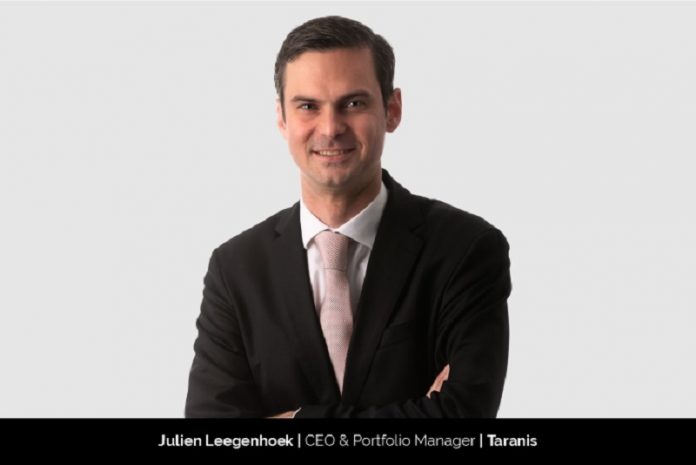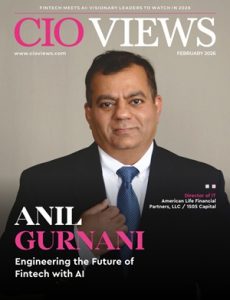Once a law student, Julien Leegenhoek got attracted to the asset management industry when he learned about the collective behaviour in the financial market. He tried to read as much as he could on economic crisis to understand the reason behind this collective behaviour. And this led to the germination of an idea, which resulted in the founding of Taranis, an innovative Swiss Asset Management company. As CEO and Portfolio Manager, Julien is building a company that is on the cusp of disrupting asset management industry through its innovative market timing algorithm.
In this exclusive interview, Julien talks in detail about what attracted him to investment management industry, inception of Taranis, its innovative offerings, and what makes his company different from their competitors. He also shares his views on success and challenges.
Tell us about your wonderful journey thus far and what led you to investment management industry?
I came to the investment management industry for a reason: the understanding of crisis. I started my education studying law. But I was not convinced. So, I stopped University for a year to think about what I really wanted to do. I remembered something from my economic classroom before high school diploma, to realize where I was interested. In a chapter about stock exchange, the authors were mentioning that “the sheeplike behaviour of investors is triggering economic crisis.” At the time, this sentence was nonsense for me. I wanted to understand what where the roots of this collective behaviour. So, during this drop-off year of school, I started to read everything about economic crisis, economic history and started to investigate what could generate bubbles and crisis. This is where I built the foundation of Taranis. This spirit of understanding the economic crisis triggered by collective behaviours is at the heart of our processes. In between, I graduated from ESSEC business school, and I also got a Master’s degree from Paris University of Economics.
As a leading business leader, how do you measure success? What has been your driving force throughout your professional journey?
As an asset manager, we are driven by performance for clients. All the research we do in the portfolio management team is made to find anomalies in behavioral finance to generate performance. For our tech product, we do fundamental work to generate performance. This research for excellence is at the heart of all our processes. When we started, my partner Zlatan Plakalo told me, “The day we won’t look for excellence, I will leave the company.” We are a young team, and we constantly try to improve our processes and our methodology.
Behavioural finance is not a new topic. As early as 1936, Keynes already questioned the validity of the “homo-economicus” assumption: “markets are moved by animal spirits and, not by reason.” Nobel prize winners Akerlof (2001) and Schiller (2013) detailed the effects of animal spirits – such as overconfidence, fear, bad faith, corruption, a concern for fairness – in understanding economic and financial cycles. Also, a study from Goyal & Welsh published in 2008 has shown that less than 10% of market movements on major stock indexes are explained by fundamental factors (earnings, dividends or macroeconomics). Thus, academical research tells us that there is something more than fundamental variables affecting the listed markets. At Taranis, we try to address a part of the unknown through behavioural finance.
Tell us about the inception of Taranis. How did it all start?
We founded the company along with my business partners, Manzurul Islam who believed in our team, as well as Zlatan Plakalo and Marco Guardiani. I was managing a thematic franchise of equity in technology with Zlatan. We built from scratch to reach $800mn in less than 3 years – the whole franchise.
We immediately felt excited to make the market timing the core of the DNA of Taranis. We measure the sentiment of the market and that gives us probabilities of upside or downside movements. We believe it is a very transformative idea of the asset management industry. If you take any fund or ETF from an asset management company, there is very little homogeneity of strategy between them. When you buy an equity fund for instance, you bundle not only the stock picking of the portfolio management team but also the portfolio construction and the market view. In an ETF, they formulate the stock picking in a rather quantitative way, with a fixed market view. In both cases, the market view is not elaborated in a systematic dynamic way.
At Taranis, we have developed what we see as a unique technology to evaluate the likelihood of the market to go up or down, based on market sentiment. Our first product that we launched is focusing purely on this market timing algorithm. We want a standalone vehicle to show the proof of concept. Going forward, we would like to create a whole range of products with as a common feature to share the same market view, based on measuring the market sentiment. We are convinced that this unified view of the market timing is what is needed for a brand in asset management from a client perspective.
Setbacks are a vital part of growth. Do you agree with this? What were a few challenging experiences that helped you grow as a person and as a business leader?
I totally agree with the importance of setback as a part of growth. I had myself quite a few of them, much more than most people experience in the asset management industry. Trying different businesses, changing studies, changing employers, and etc. Setbacks are important to assess what you believe is really needed, which sometimes force you to change and sometimes reinforce your convictions.
Share with us a few insights about Taranis and its products/services.
Taranis Market Sentiment is our core product. It shows our vision or asset management: the importance of the market timing. This is why our first product is focusing only on trying to anticipate market movements. We have only one position here, which is S&P Futures. We can be long, with or without leverage, net cash, or short. The investment is based on a proprietary systematic model based on behavioural finance. Our other products will be inspired by the market vision of Taranis.
Our second product is dedicated to investment in listed innovative companies. This is my background in the banks I worked for, along with my colleague Zlatan Plakalo at Union Bancaire Privée. We do here in-depth bottom-up research and we focus on very innovative companies. At our previous employer UBP, we were in charge of the thematic franchise. We have a quite unique process for the portfolio construction that we resume in a pyramid structure. We start with bottom-up research to identify best companies to invest in, based on the understanding of technology, the market, the positioning and market drivers, and of course the valuation. As a second step, we do what we call group picking, where we also invest in the best peers. Then, as a third step, we do our portfolio construction, depending on our market view. We have several groups of stocks with different drivers. When we are more bullish, we tilt our investments more on the highly disruptive companies. When we turn more cautious or negative, we structure the portfolio in a more balance way.
We aim to launch more products in the future, and the market timing with be the building block of our portfolio construction in every fund. We believe that this unified view of asset management based on the market timing can be very transformative.
How have you been exposed to competition in the industry? Also, tell us what makes Taranis different from its competitors?
I have worked in several hedge funds and funds. Notably, I started my career in 2008 at Morgan Stanley Frontpoint in London. Then I joined Lombard Odier 1798, in Geneva, a long short dedicated to investment within the technology sector. I also worked at Indosuez and Union Bancaire Privée, also based in Geneva.
In all those houses, my experience was very intense in financial modelling, information gathering and decision taking. I was exposed to the conundrum of finance: the too high volume of data that a team of portfolio managers or advisors handles. Most of the time, the equity market direction has a bigger impact on the contribution performance than the equity pick itself. Those experiences reinforced my conviction that the market direction is the key element of performance and need to be addressed in a new way. Our target is to have a separate process to assess the market direction at Taranis.
The market timing through behavioural finance is for us a very new way to structure an asset management company and maybe one day this could become mainstream. Along with Marco Guardiani, we have tried to show this spirit in all our touchpoints, specifically on our website, by trying to let clients have a new modern experience.
Give us an overview of your day at work. Share with us your roles and responsibilities as the CEO of Taranis.
As CEO of Taranis, I split my day at work between the portfolio management and the management of the company.
Tell us about your proud moment as a leader and the achievements of Taranis?
When we were shortlisted for the best quant funds in Europe by the platform HFM, I was very proud of the team and the work we had done. We had only half of the period that the peers had (6 months, from January to June 2021) – we just started the trading at the end of December 2020. We are a very young team, and we created everything from scratch and we worked very hard. After all the work, that was a special moment for us. That was really a team work as everyone was focused on their field to achieve, and it is an achievement for a young team, notably in the face of very high competition.
What is the motivating factor that binds the team of Taranis together?
We bring a fresh spirit to the banking world with human interaction being at the heart of our business. All full-time members of our team are under 40. We live and breathe a start-up culture: innovative, fast, out of the box, aspirational. Each team member brings a unique background from renowned universities and across industries.
What is your vision for the future of Taranis?
We are constantly improving our market timing algorithm, which is at the heart of our process. We have a lot of research programs that we want implemented.
Then, we want to build around the market sentiment thermometer. We have a second product build around this market timing tool. Our portfolio construction and position sizing of our equity picks are influenced by the market sentiment.
What does the roadmap of Taranis look like, for the future? What are your goals for the next few years?
For the future, we would like to consolidate our existing position first and then expand. First, we have several internal research programs that we are very excited about. Also, the team is growing. We are setting up a UK Office. We are planning a few events about our fields. We are very happy with our first year, and we have high hopes for the future.
What advice would you give your younger self? What is your message to aspiring business leaders?
I would say to my younger self: “follow your inner voice.” Intuition is a set of knowledge that comes from an unknown area but which seems very powerful, specially combined with hard work and rationalization.
Curiosity and an insatiable thirst for knowledge have ensured that Julien is on the path to carve a special place for himself as an entrepreneur in the asset management industry. He is a success story despite facing several stumbling blocks.





